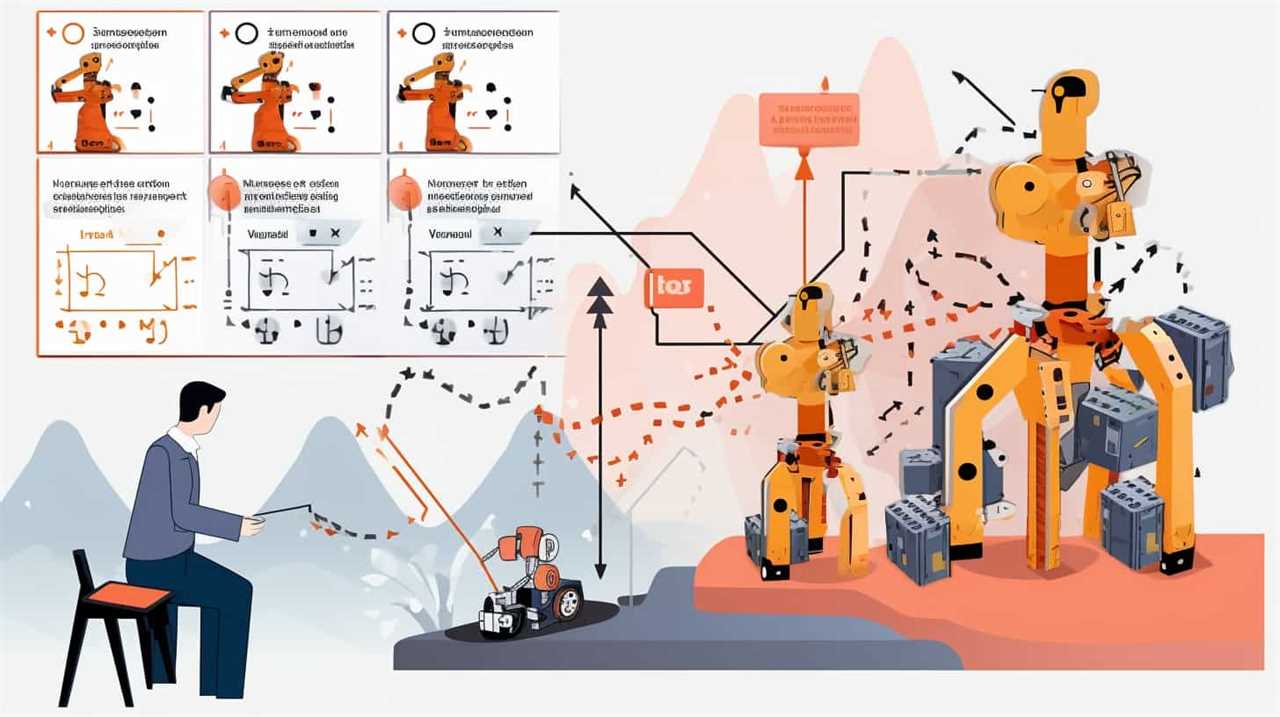As someone knowledgeable in cybersecurity, I am at the forefront of a revolutionary period in safeguarding data. The emergence of AI security signifies the beginning of a new era in a world plagued by constant threats.
With AI-powered threat detection and prevention, we have a powerful ally in safeguarding our valuable information. By harnessing the capabilities of artificial intelligence, we can enhance data privacy like never before.
However, we must also navigate the challenges that come with this cutting-edge technology. Join me as we explore the exciting possibilities and obstacles in AI-driven data protection.
Key Takeaways
- AI continuously monitors and analyzes potential security threats, enabling organizations to stay one step ahead of cybercriminals.
- AI-powered systems can detect and respond to potential attacks faster than traditional methods, minimizing potential damage.
- AI-powered anomaly detection identifies and addresses unusual patterns and activities that may go unnoticed by traditional rule-based systems.
- AI security solutions automate compliance processes, enhance incident response, and protect against potential breaches, minimizing the risk of data exposure and protecting user privacy.

The Role of AI in Data Protection
In my experience, AI plays a crucial role in enhancing data protection by continuously monitoring and analyzing potential security threats. Machine learning, a subset of AI, enables systems to learn from data and make intelligent decisions to identify and mitigate security risks. By analyzing patterns and anomalies in real-time, AI-powered systems can detect and respond to potential attacks faster than traditional methods. This proactive approach helps organizations stay one step ahead of cybercriminals and safeguard sensitive information.
However, while AI offers significant benefits in data protection, ethical concerns also arise. As AI algorithms are trained on vast amounts of data, there’s a risk of bias and discrimination, which can lead to unfair outcomes or privacy breaches. It’s crucial to develop AI systems that are transparent, accountable, and adhere to ethical principles. Additionally, ongoing monitoring and auditing of AI systems are necessary to address any potential ethical issues and ensure the responsible use of AI in data protection.

AI-Powered Threat Detection and Prevention
Continuing from the role of AI in data protection, AI-powered threat detection and prevention plays a vital role in proactively safeguarding sensitive information by continuously monitoring and analyzing potential security threats. With the advancements in cybersecurity and the use of machine learning algorithms, AI has become an essential tool in identifying and mitigating security risks.
Real-time threat detection: AI-powered systems can analyze vast amounts of data in real-time, allowing for immediate identification of potential threats. By continuously monitoring network traffic, user behavior, and system logs, AI algorithms can quickly detect anomalies and flag suspicious activities.
Predictive threat prevention: Through the analysis of historical data and patterns, AI can predict and prevent potential threats before they occur. By leveraging machine learning algorithms, AI systems can identify trends and indicators of future attacks, enabling organizations to take proactive measures to strengthen their security defenses.
Automated response capabilities: AI-powered threat detection systems can’t only identify threats but also respond to them in real-time. By automating security protocols and incident response procedures, AI can reduce the time it takes to mitigate an attack, minimizing the potential damage and impact on the organization.

Harnessing AI for Anomaly Detection
AI-powered anomaly detection is revolutionizing data protection by identifying and addressing unusual patterns and activities. This innovative approach combines real-time monitoring and predictive analytics to detect anomalies in vast amounts of data, enabling organizations to proactively mitigate emerging risks.
By leveraging the power of AI, anomaly detection algorithms can analyze data in real-time, continuously learning and adapting to evolving threats. These algorithms can detect anomalies that may go unnoticed by traditional rule-based systems, allowing for early detection of potential security breaches or fraudulent activities.
Moreover, AI-powered anomaly detection provides organizations with valuable insights into their data, enabling them to identify patterns and trends that may indicate potential risks or opportunities. With the ability to analyze vast amounts of data quickly and accurately, AI is transforming data protection and revolutionizing the way organizations safeguard their valuable information.

Enhancing Data Privacy With AI Security
To ensure data privacy, organizations can leverage AI security solutions that provide enhanced protection against potential breaches and unauthorized access. AI-powered technologies offer a multitude of benefits when it comes to data privacy, specifically in terms of real-time monitoring and privacy compliance.
Here are three key ways AI security can enhance data privacy:
- Real-time monitoring: AI algorithms can analyze vast amounts of data in real time, detecting any anomalies or suspicious activities that could indicate a potential breach. By continuously monitoring data flows and network traffic, AI security solutions can quickly identify and respond to any threats, minimizing the risk of data exposure.
- Privacy compliance: With the increasing number of data protection regulations, such as GDPR and CCPA, organizations must ensure they’re in compliance. AI security solutions can automate compliance processes by identifying and classifying sensitive data, implementing privacy controls, and generating audit reports. This helps organizations meet regulatory requirements and protect user privacy.
- Enhanced incident response: In the event of a security incident, AI security solutions can enable faster and more accurate incident response. By leveraging machine learning and pattern recognition, AI can analyze past incidents, identify common attack patterns, and provide recommendations for remediation. This allows organizations to effectively mitigate risks and prevent future breaches.

Overcoming Challenges in AI-Driven Data Protection
As an AI security solution evolves to enhance data privacy, challenges arise in the realm of AI-driven data protection. Building trust in AI security becomes paramount in order to overcome these challenges.
With the increasing reliance on AI for data protection, it becomes crucial to ensure that AI systems are transparent, accountable, and operate ethically. Ethical considerations in AI-driven data protection involve not only the responsible use of AI algorithms, but also the fair and unbiased processing of data.
It’s essential to address issues such as algorithmic bias, unintended consequences, and the potential misuse of AI technology. By implementing robust ethical frameworks and guidelines, organizations can foster trust in AI security and ensure that data protection remains a top priority.

Frequently Asked Questions
How Does AI Technology Work in the Field of Data Protection?
AI technology works in data protection by analyzing large amounts of data, identifying patterns and anomalies, and predicting potential threats. It has the potential to revolutionize data security and shape the future of protecting sensitive information.
What Are Some Common Threats That Ai-Powered Threat Detection and Prevention Can Identify?
As an AI expert, I can confidently say that AI powered threat detection and AI driven anomaly detection are crucial tools in identifying common threats in data protection.
How Can AI Help in Detecting Anomalies in Data and Identifying Potential Security Breaches?
AI powered anomaly detection and machine learning for security can greatly enhance data protection by identifying potential security breaches and detecting anomalies in data. This advanced technology is a crucial tool in safeguarding sensitive information.
What Specific Techniques or Algorithms Are Used in AI Security to Enhance Data Privacy?
Privacy preserving techniques are crucial in AI security for data protection. Machine learning algorithms, such as differential privacy and homomorphic encryption, play a significant role in enhancing data privacy by safeguarding sensitive information during data processing and analysis.
What Are Some of the Major Challenges Faced in Implementing Ai-Driven Data Protection and How Can They Be Overcome?
Implementing AI-driven data protection poses challenges such as ensuring the accuracy and reliability of AI algorithms, addressing privacy concerns, and maintaining compliance with regulations. These challenges can be overcome through rigorous testing, robust data governance, and collaboration with experts in the field.

Conclusion
In conclusion, the rise of AI security marks a new era in data protection. With its ability to detect and prevent threats, identify anomalies, and enhance privacy, AI is revolutionizing the way we safeguard our information.
However, as we navigate this new landscape, it’s crucial to address the challenges that come with AI-driven data protection. By staying ahead of the curve and embracing the power of AI, we can ensure a safer future for our valuable data.
So, let’s say goodbye to outdated methods and welcome the dawn of AI security.
Olivia stands at the helm of Press Report as our Editor-in-chief, embodying the pinnacle of professionalism in the press industry. Her meticulous approach to journalism and unwavering commitment to truth and accuracy set the standard for our editorial practices. Olivia’s leadership ensures that Press Report remains a trusted source of news, maintaining the highest journalistic integrity in every story we publish.










